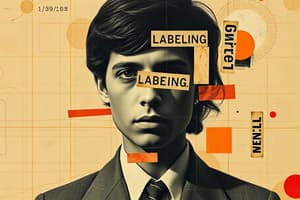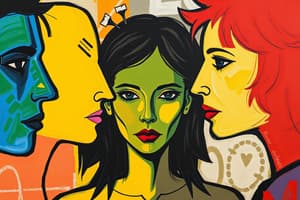Podcast
Questions and Answers
What is Labeling Theory?
What is Labeling Theory?
Society creates crime and criminals by labeling people as deviant, focusing on perceptions of criminal behavior rather than the behavior itself.
What does Cultural Deviance Theory state?
What does Cultural Deviance Theory state?
It is based on the assumption that members of certain subcultures adapt to the values of the subculture they belong to.
What is the Consensus Model?
What is the Consensus Model?
The theory that the majority of citizens in a society share the same values and beliefs, and criminal acts conflict with these values.
What is Choice Theory?
What is Choice Theory?
What does Control Theory focus on?
What does Control Theory focus on?
What is the Crime Control Model?
What is the Crime Control Model?
What does the Conflict Model describe?
What does the Conflict Model describe?
What is Social Disorganization Theory?
What is Social Disorganization Theory?
What does Social Conflict Theory focus on?
What does Social Conflict Theory focus on?
What are Social Process Theories?
What are Social Process Theories?
What is Learning Theory as proposed by Edwin Sutherland?
What is Learning Theory as proposed by Edwin Sutherland?
What does the Due Process Model prioritize?
What does the Due Process Model prioritize?
What is Strain Theory?
What is Strain Theory?
What does Racial Threat Theory examine?
What does Racial Threat Theory examine?
What is Life Course Criminology?
What is Life Course Criminology?
What is Self Control Theory?
What is Self Control Theory?
The Learning Process involves learning to perceive pleasurable effects of ______.
The Learning Process involves learning to perceive pleasurable effects of ______.
Study Notes
Labeling Theory
- Society influences crime by labeling individuals as deviant.
- Focuses on perceptions and societal reactions rather than the behavior itself.
Cultural Deviance Theory
- Suggests that certain subcultures adopt distinct values and norms.
- Members of these subcultures may engage in behavior deemed deviant by the broader society.
Consensus Model
- Reflects shared values and beliefs among the majority in society.
- Views criminal acts as violations of these collective values and beliefs, posing harm to society.
Choice Theory
- Views criminal behavior as a rational choice based on cost-benefit analysis.
- Offenders weigh potential benefits of crime against the risk of apprehension.
Control Theory
- Developed by Travis Hirschi.
- Investigates the reasons why individuals refrain from committing crimes.
Crime Control Model
- Prioritizes society's right to be safeguarded from crime and violent offenders.
- Emphasizes punishment and deterrence as key components of justice.
Conflict Model
- Suggests criminal law is shaped by groups with economic, political, and social power.
- Reflects tensions and struggles between different social groups.
Social Disorganization Theory
- Originated by Shaw and McKay.
- Proposes that deviant behavior flourishes in communities with weak social institutions (e.g., families, schools) that fail to control behavior.
Social Conflict Theory
- Founded by Karl Marx.
- Centers on the role of power dynamics in shaping criminal behavior and societal reactions.
Social Process Theories
- Argue that all individuals have the potential for criminal behavior.
- Emphasize the influence of social interactions and processes on behavior.
Learning Theory
- Popularized by Edwin Sutherland.
- Asserts that criminal behaviors are learned through social interactions and require specific skills for execution.
Due Process Model
- Focuses on protecting individual rights against government power.
- Ensures fairness and justice within the criminal justice system.
Strain Theory
- Proposed by Emile Durkheim.
- Highlights a disjunction between socially accepted goals and the means available to achieve them, leading to deviance.
Racial Threat Theory
- Examines the control exerted by the criminal justice system over minority communities, particularly Black individuals.
- Suggests majority groups maintain social control through repression of minorities.
Life Course Criminology
- Developed by Cullen and Agnew.
- Identifies early conduct problems (e.g., lying, stealing) as strong predictors of future criminal behavior.
Self Control Theory
- Founded by Gottfredson and Hirschi.
- Links criminal behavior to low self-control, often resulting from inadequate parenting during early childhood.
Learning Process
- Involves three stages related to drug use:
- Learning the techniques of drug use.
- Recognizing and enjoying the pleasurable effects.
- Valuing the social experiences associated with drug use.
Studying That Suits You
Use AI to generate personalized quizzes and flashcards to suit your learning preferences.
Description
Explore key concepts in criminal justice with this flashcard quiz. Learn about various theories such as Labeling Theory and Cultural Deviance Theory, which explain how society influences perceptions of crime. Perfect for students looking to deepen their understanding of criminology and societal impact on criminal behavior.




